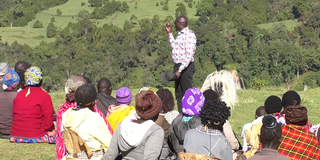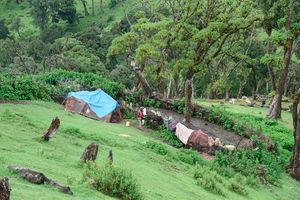Win-win deal for Sengwer community, Kenya Forest Service in Embobut conservation plan

Members of Sengwer community during a consultative forum on conservation of the degraded Embobut Forest in Elgeyo Marakwet County.
What you need to know:
- The Sengwer community is one of the remaining forest-dwelling people who occupy part of Cherangani Hills, but their way of life is threatened with extinction due to forest degradation.
Controversy over the recurrent forceful evictions of the Sengwer from Embobut Forest in Elgeyo Marakwet County is set to be resolved following a pact between the community and Kenya Forest Service (KFS) on the conservation of the degraded water tower.
The deal involves active participation by the indigenous Sengwer community in conservation efforts to restore the degraded ecosystem, while KFS and the Elgeyo Marakwet County government will initiate projects aimed at sustaining the community, which has been accused of encroaching Embobut Forest that forms part of the larger Cherangani Hills, one of the country’s water towers.
Under the agreement, KFS has set aside 10 acres of forest land to enable members of the community to establish tree nurseries for indigenous trees in a move that enhances the harmonious relationship between the government agency and the locals, who have for a long time been at loggerheads following a series of forceful evictions from the forest.
“The pilot project is aimed at finding long-lasting solutions in the restoration of the degraded ecosystem and improving the forest cover,” said Thomas Kiptoo, KFS North Rift head of conservancy.
He maintained that the arrangement does not warrant the community to set up settlements in the forest.
KFS has in the past carried out repeated evictions of more than 600 families in a move it said was aimed at protecting Cherangany water towers from further degradation due to unlawful logging and agricultural activities, unregulated fencing of the forest land for commercial grazing, and charcoal burning.
However, the community has dismissed claims by KFS that they are involved in destroying the public forest.
“We are committed to working with KFS and relevant authorities to restore and protect Embobut Forest. KFS should, however, remove non-Sengwer members who have encroached on our forest land and are carrying out destructive illegal activities,” said Elias Kimaiyo, a human and environmental activist.
KFS has set aside 10 acres of land for the Sengwer community to establish tree nurseries in Kapkok Glade, plant seedlings in degraded areas within Embobut Forest, and set up a cultural centre for preservation, promotion, and dissemination of knowledge on traditional aspects of conserving the environment.
“The cultural centre will empower our community to document traditional methods of environmental conservation and hand them over to the other generations,” said Paul Kitum, chairman Sengwer Council of Elders.
Elgeyo-Marakwet County Ecosystems Conservator Paul Koech said the pilot project at Kapkok area will be extended to Kiptirbai and Koropkwen glades within Embobut Forest.
The devolved unit has allocated Sh1.48 million under the locally-led climate action plan to support the community in seed multiplication to boost afforestation programmes.
“We have allocated a further Sh2 million to buy Merino sheep to support livelihoods as part of the recommendation by the community,” said Jason Lagat, Environment executive.
The Sengwer community is one of the remaining forest-dwelling people who occupy part of Cherangani Hills, but their way of life is threatened with extinction due to forest degradation.
They are part of the 2,874 squatters who were given Sh410,000 each in 2013 to buy alternative land to settle and have encroached on the forest that forms part of the larger Cherangani Hills, one of the country’s key water towers.
“Most of the Sengwer were left out of the compensation process and in any case, how can one start a new life with the Sh410,000 much away from their ancestral home?’ Posed Joseph Lopeta, a squatter.
The government through KFS has previously carried out a series of forceful evictions of squatters from the Embobut Forest.
Suspected bandits in 2019 burnt a KFS conservation station neighbouring Embobut Forest, which is part of the Cherangani water tower. The 12 KFS officers manning the station escaped unhurt during the protracted attack over the illegal occupation of the forest.
They moved to the East African Court of Justice in Arusha, Tanzania which ruled in their favour and called on the government of Kenya to end the evictions and settle the Sengwers in the forest.





